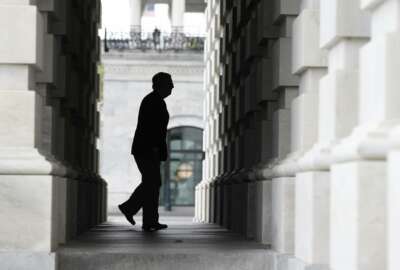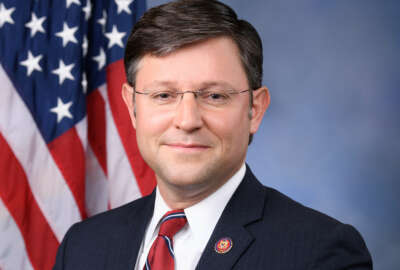
Pandemic doesn’t mean EPA clean up efforts stop
EPA inspectors spend a lot of time in the field, now the agency has given regional managers new flexibility to reduce field work in light of the coronavirus.
Best listening experience is on Chrome, Firefox or Safari. Subscribe to Federal Drive’s daily audio interviews on Apple Podcasts or PodcastOne.
Inspectors at the EPA spend a lot of time in the field, looking into cleanup sites, underground tanks, oil spills, you name it. Now it has given regional managers new flexibility to reduce field work in light of the coronavirus. For how the agency developed this policy and what it’s telling the regions, Federal Drive with Tom Temin turned to the Assistant Administrator for the office of Land and Emergency Management, Peter Wright. Read the full guidance here.
Interview transcript:
Tom Temin: Mr. Wright. Good to have you on.
Peter Wright: Thank you Tom for having me.
Tom Temin: Tell us about this new policy. I guess it’s for the duration of coronavirus. What is it that you are letting the regions decide on?
Peter Wright: Well, to address the current situation posed by the COVID-19 situation, the guidance that you’ve introduced reinforces that decisions about continuing reducing or pausing on site fieldwork activities are going to be made on a case by case basis. And just to emphasize that officers are directed to make decisions about ongoing fieldwork by first thinking about the protection and health and safety of the public as well as maintaining the health and safety of EPA staff and the contractors and other cleanup partners. Secondly, coordinating closely with state, federal, tribal and local health authorities on all of these decisions to do field work. And third, maintaining EPA is ability to prevent and respond to public and environmental emergencies. The same approach will apply to EPA decision making related to requests for extensions or delays in performance from outside parties who are engaged in cleanup activities. So this could include states tribes, local governments, other federal agencies, other parties, property owners, these decisions with respect to these other parties will be made in accordance with existing agreements we have or enforcement agreements that apply to particular cleanup sites.
Tom Temin: Now is the rationale that you don’t want your field staff to come close to people because of the coronavirus. Is that the basic premise?
Peter Wright: Well, typically, it’s often the case because these are construction related activities. There isn’t a need to often come into close contact with people but we certainly have provided guidelines if that becomes the case to take you know, appropriate measures all in accordance with CDC guidance. What we’re doing is continuing to adjust, you know, to the situation as it evolves. You know, we issued guidance to ensure that decisions about cleanup work, you know, are being made, again in close consultation with the health and safety of communities, state and tribal partners. And so we hope that this helps us to make nationally consistent decisions to address sites across the country,
Tom Temin: Give us a sense of the types of activities that would be affected by this or what types , what does field work involve? I mean, if there’s some leak of a giant tank that I can understand, but what happens day to day in general for EPA?
Peter Wright: There is a very broad range of field activities. You mentioned an emergency situation like a fuel tank, I mean, we certainly respond to any number of incidents involving chemical and oil releases. So those would be done on emergency matter. But far and away most of the work that this impacts would be cleanup work undergoing under the Superfund Program. It could also take place under the RCRA Corrective Action Program, TSCA PCB cleanup program, the Oil Pollution Act or Leaking Underground Storage Tank Program. And again, this applies where EPA is actually the lead agency or overseeing the responsibility the work being performed under any of those EPA cleanup programs I just listed off.
Tom Temin: So from what you said that it sounds like in general, you’re trying to rationalize field work, and this could continue after the coronavirus has receded?
Peter Wright: Well, again, all of these decisions are being made on a site specific basis in conjunction again, with all the facts and circumstances, and actually, in many ways, it just reinforces the way that we approach cleanup sites, that cleanup sites are made on a site specific basis. So again, as conditions vary in different localities, you know, that may lead to different decisions being made about particular kinds of work and sites, much of the work that takes place with respect to cleanups actually takes place, of course, away from the field. There’s a lot of planning and preparation and studies. And we hope all of that continues a pace. But certainly the current situation can impact a time, so situations as well.
Tom Temin: And so this is basically then the decision of the regions, I guess that would maybe move downstream a little bit to the local administrators, local managers that know the tribes, know the facilities that they might have to regulate or look after. I mean, it sounds like you’re trying to push the decision making down to where people have the most knowledge of the situation?
Peter Wright: Right. And actually, what it does is it reinforces where the decision making actually even occurred pre coronavirus that the implementation of our cleanup programs do take place principally in the regional offices. So you know, individual decisions are made by a regional administrator to their designee. In almost all cases for any particular cleanup program, there’s a particular EPA individual. Might be a remedial program manager, it might be an on site coordinator, who particularly is overseeing that work, and frequently makes all sorts of decisions in the ordinary course with respect to the conduct of that work. And so that, you know, as we go through the current situations as I said, decisions are being made in conjunction also with the health guidance, federal, state and local level. Although I’ll say this, we are certainly well coordinated here at headquarters with EPA senior leadership, with the activities that are going out on the field, and we’ve received regular reports and provide guidance as necessary.
Tom Temin: And what if someone like a third party were to say, you know, you really ought to come out and look at this, and the decision might have been made, well we don’t need to look at it under this new guidance, it’s not an emergency in our opinion, or in the opinion of the person on the scene. What if a third party says, I don’t think so. I think the spill looks worse than you might imagine. Would that possibly cause a change in decision?
Peter Wright: Well, again, I you know, are one of the premise of all the guidance that we’re giving it is to be able to respond to emergencies. So again, releases qualifies emergency. So we’ve maintained the ability to, you know, to rapidly respond throughout the course of this current situation with COVID-19. You know, there’s always a possibility, you know, there would be some assessment about whether it was really necessary to respond to the field. But I would expect that we would most likely respond if there’s a current situation ongoing to protect the public public health and protect the environment.
Tom Temin: Sounds like you’re really taking a risk management approach to field work, such that, I guess I got that from your statement that you’re trying to make sure that you preserve the ability to react when you really have to, to maybe swarm the jets if something bad happens, but not have people constantly out there for every little thing that may or may not really require EPA eyes at that moment.
Peter Wright: Yeah, I think that’s probably generally a fair characterization. I mean, there’s certainly some work that that decisions are being made on to pause because the potential impact is negligible and the overall impact of a slight delay in certain kinds of work are going to have a lot of issues. And again, we’ve taken decisions to delay work in consultation with particularly state and local health authorities where maybe that was their request that we delay work for some period of time and we’re certainly honoring those. And again, we’re very conscious and concerned about the health of our employees and our contractors who would go out and do work. And again, in some situations, it may make sense to delay certain work for a period of time.
Tom Temin: And since this new policy has come out, have you seen any changes or any measurable results or the field people telling you yeah this is great?
Peter Wright: Well, actually, what if I might give it an overall assessment about what’s occurring? And again, we get asked about, you know, what, how many sites work has been paused, and as of about a week ago, but the number does change, you know, on a frequent basis. They had about 55 sites on the superfund national priorities list where some degree of work had been paused. But that’s actually a fairly small fraction of all the field work that’s going on. Because much again, of these work field work under our remedial programs, if you will, it’s it’s effectively construction work, you know, as you can see, in many parts of the country, that’s the kind of work that even under different sets of state and local restrictions has been allowed to continue forward. And so again, in most places, we’re continuing with the normal field construction work. But again, we’re thinking about every every situation on a site by site basis.
Tom Temin: Peter Wright is the Assistant Administrator for the Office of Land and Emergency Management at the Environmental Protection Agency. Thanks so much for joining me.
Peter Wright: Well, thanks so much for having me and giving us this opportunity to talk about this important work during these challenging times.
Copyright © 2024 Federal News Network. All rights reserved. This website is not intended for users located within the European Economic Area.
Tom Temin is host of the Federal Drive and has been providing insight on federal technology and management issues for more than 30 years.
Follow @tteminWFED





